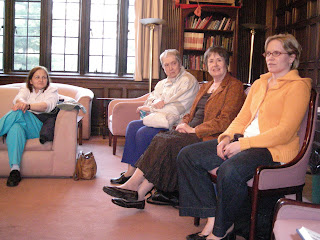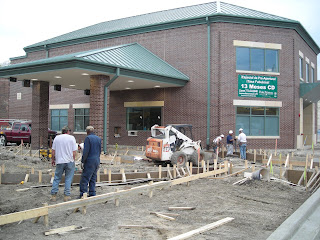
L-R Rev. Don Coleman and Rabbi Lawrence Edwards
Religious PanelTonight I attended a lecture on reproductive choice. The two panelists were Rabbi Lawrence Edwards and Rev. Don Coleman. Rabbi Edwards shared the following reflections and highlights:
*life does not begin at conception
*The first forty days the fetus is water and the human being begins at birth or once the head emerges from the mother
*The mother's life is primary. That however doesn't mean you can do whatever you want to do. However, the life and health of the mother is number one.
*Complex questions can arise that do not make these choices easy
*life is not to be taken casually
*There could be circumstances in which abortion would be permitted for the other's health and wellbeing requiring medically and ethically the need for an abortion
*equal access for everyone is important
Rev. Don Coleman shared these thoughts:
*Living and working as a campus minister Coleman helped over 100 women obtain abortions while serving at Lubuck Texas University.
*He helped raise money so that these individual could travel to Los Angeles, CA for abortions
*His role as he saw it was to help the women sort through the moral issues by supporting their decision, asking some hard questions and then if necessary helping them fundraise.
In doing this work Coleman stated he learned the following: 1) The woman is the only one that can make this choice and 2) There needs to be a community of poeple to support women and 3)to have someone in the faith community condemn a woman's choices is arrogant and meanspirited and 4) men are terribly irresponsible around this issue and that women tend not to inform their partners or the fathers because they do have believe that they will support them
Some of the Take aways:
1) God is a God of conscious and helps us make choices. For sme people, God and the will of God is important in the process of deciding about unwanted pregnancy. Thus, giving it over to God as moral agent might be the choice some faith based women would make.
2) women are moral agents that have the right to make decisions that impact their lives
3) Affirming women's rights to make the decision is crucial
4) the community needs to be supportive and not judgemental
5) We need to make sure that hospitals are safe places to go.
6) We need to offer women a range of services
7) make sure that adequate health care is available
A question that was posed is what role does civil authority play in this issue? The question was not answered so I leave it upon your heart and mind to grapple with!
Another topic that the participants and panelists grappled with was abstinence. Rabbi Edwards informed the audience that he did not endorse casual sex. Sex according to Edwards is very potent and I might add, a sacred experience. However, everyone agreed that not talking about it does not work. While everyone did not agree on everything, it appears that there might be agreement that everyone should have as much information as possible to make the best and most responsible choice. Whether that choice to become sexually active or to decide about an unwanted
pregnancy.
At the conclusion of the evening I wonder how many hearts were opened or changed and how many eyes were opened! May we work to create a world where all life is valued and that we are able to receive information without fear so that all life will be desired!
Blessing! Rev. Qiyamah








 />
/>













